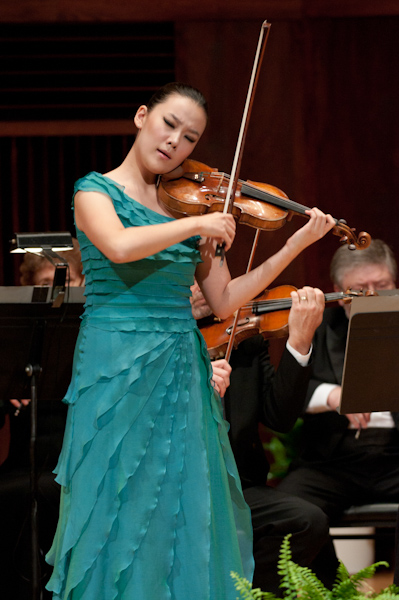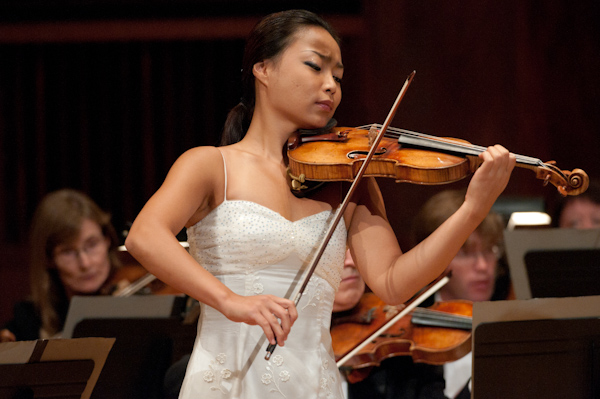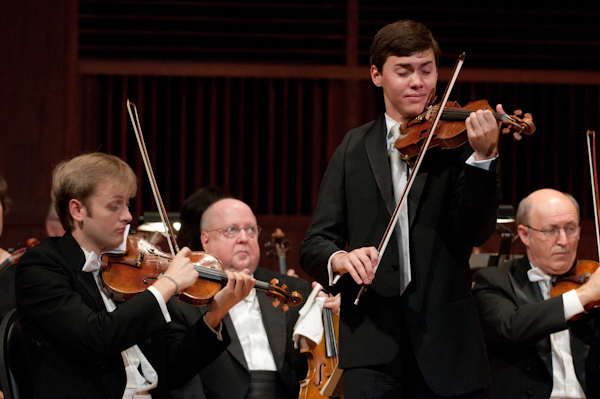International Violin Competition of Indianapolis
The Eighth International Violin Competition of Indianapolis Indianapolis, Indiana September, 2010The Eighth Quadrennial International Violin Competition of Indianapolis, which is one of the world’s most important, uniquely versatile competitions, recently held its final rounds with concerto performances by six Laureates and the Indianapolis Symphony Orchestra. Throughout most of September, 2010, there were many informative violin demonstrations, forums, showcases, recitals, performances, interviews and pre-concert lectures, and after an extremely fascinating display and comparison of old and new violins by Indianapolis Symphony Orchestra concertmaster Zachary De Pue—with voting by the audience (the public chose a 1717 Stradivari that is coincidentally owned by juror and world renowned violinist Cho-Liang Lin)—jury President Jaime Laredo announced the winners. The Gold Medal was awarded to 23 year-old Clara-Jumi Kang from South Korea/Germany. Silver and Bronze medals were also awarded this year, with the Silver Medal going to 25 year-old Korean Soyoung Yoon and the Bronze Medal going to young American Benjamin Beilman, only 20 years of age and studying at the Curtis Institute in Philadelphia.
I enjoyed Beilman’s Sibelius Concerto immensely; it sweeped certain tired traditions clean. His phrases were shaped with distinct dynamic and tone-color contrasts, and there was an unusual longing and mystery to his interpretation, bringing simplicity and an honesty of spirit to the score I had never heard before. Because of that, I thought there was a chance he would be awarded the top prize. But because of some slight slips in the last movement and because other stages of the competition are taken into account, I thought Clara-Jumi Kang, who played the Beethoven Violin Concerto with sublime purity of tone and a fantastic precision for pitch and rhythm, would place very high. The choice of Beethoven instead of other concertos that might show more flashy virtuosic brilliance was a brave one, and it paid off for Kang, who won the Gold plus five special prizes. In the Beethoven concerto, she displayed the perfect balance of Classical Period simplicity and early Romantic expression—very difficult to accomplish for such a young violinist who wants to impress in competition. What she was able to show—above all else—was her extraordinary musicianship for her age, or any age for that matter. The slow movement, a daunting task in the high range of the instrument, is something which prevents many violinists from taking on this concerto. She performed it with sublime beauty. Beilman, incidentally, did win special prizes for best performance of a Bach work and for best performance of a Mozart Sonata.
I guessed on target with regards to the Silver medal and the 4th, 5th and 6th place Laureates. Silver medalist Soyoung Yoon was as solid as a rock in her performance of the Sibelius Violin Concerto. She nailed all the octave and arpeggiated passages—plus the up-bow spiccato and double-stop passage work. She has a very rich, resonant middle range, though oddly her low G-String and very high range didn’t project as well. There was some monotony in this powerhouse performance; the playing needed more contrasting tone and dynamics, and more gradual pacing of the phrasing. 20 year-old Chinese violinist, Haoming Xie, was the Fourth Place Laureate—but he did win two special prizes for best violin-piano sonata (other than Beethoven) and best Ysaye Sonata performance. His playing in the Tchaikovsky concerto had lovely tempo contrasts, dynamic and tone variation, and sensitivity to peaks of phrases that were all lacking in 6th place Laureate and Russian violinist Andrey Baranov’s performance of that same concerto. Baranov, who unfortunately rushed quickly through the Tchaikovsky with some indifference, had a very lush sound that was hard to dislike, but—as with some of the other laureates— it didn’t often vary away from that.
The 29 year-old Hungarian Antal Szalai, who placed Fifth, performed the difficult Bartok violin Concerto No. 2 with technical brilliance, but with nothing really unique to say with regards to color, dynamic expansion or a true sense of the Hungarian style with all its freedoms—and didn’t come close to past Indianapolis Gold medalists Barnabas Kelemen and Augustin Hadelich, who played this very work in the Indianapolis finals when they won in 2002 and 2006 respectively. Kelemen and Hadelich are both doing extremely well, incidentally. Hadelich recently performed as soloist with the New York Philharmonic and the Cleveland Orchestra, and Kelemen will be making his London Philharmonic debut. The major successes and exposure of these recent Indianapolis Gold medalists is reaching new plateaus; the winners prior to 2002 have been very successful, but more as recitalists and chamber musicians. Kyoko Takezawa, the 1986 Gold Laureate, enjoys a great solo career, playing with many major orchestras, though less-so recently. Ida Kavafian, a Silver medalist from 1982, is a highly successful chamber musician. There are even prominent orchestral musicians, as in the case of Juliette Kang (1994 Gold) who plays in the Philadelphia Orchestra, and David Chan—an American Bronze medalist from 1994—who is co-concertmaster at the MET. An American has never won gold in this competition’s history, although 6 out of the 8 competitions over the last 28 years have produced a third-place American winner.
The Indianapolis Symphony Orchestra, which is an important fixture at this competition and is most often associated with its venerable music director and conductor laureate Raymond Leppard, played with much sensitivity and enthusiasm, and they clapped appreciatively after every performance. Samuel Wong conducted two Tchaikovsky concertos and two Sibelius Concertos with great awareness to the varying details in each soloist’s interpretation; he did a fantastic job. The Hilbert Circle Theater is an acoustical gem, producing a natural, needed warmth and amplification to the Indianapolis string sound. Acoustical help aside, the strings have improved under its new concertmaster, Zachary De Pue.
The backgrounds of the Laureates give a clear indication of the high level and experience required to become a finalist. Gold Medalist Clara-Jumi Kang started violin and piano lessons at the age of three and entered the Mannheim Musikhochschule at the age of four. At the age of seven, she auditioned at The Juilliard School where she was accepted with a full scholarship. Her numerous prizes in international competitions include First Prize at the 2010 Sendai International Violin Competition, Second Prize at the 2009 Hannover International Violin Competition, and First Prize at the 2009 Seoul International Violin Competition. Clara-Jumi is currently studying under Nam Yun Kim at the Korean National University of Arts where she was accepted as one of the youngest college students. Silver Medalist Soyoung Yoon received her first violin lesson at the age of five in her native South Korea. She was a prizewinner at the Queen Elisabeth Competition in Brussels and the Tchaikovsky Competition in Moscow. She also received Grand Prize at the Odessa International David Oistrakh Violin Competition and First Prize at the Menuhin International Violin Competition in 2002. Soyoung has toured as a soloist and chamber musician throughout Asia and Europe. Previously a student at the Musikhochschule Köln, she is currently studying at the Zurich University of Arts in Switzerland.
Bronze Medalist Benjamin Beilman has appeared as a guest soloist with the Philadelphia, Detroit, and New Mexico symphony orchestras and is a Presidential Scholar in the Arts. He won First Prize at the 2010 Montreal International Music Competition, First Prize and the Bach Prize at the 2009 Corpus Christi International String Competition, and was the Gold Medalist at the 2007 Stulberg International String Competition. A featured artist at the Marlboro Music Festival since age 17, he joins Musicians from Marlboro on tour in 2011. Benjamin currently attends The Curtis Institute of Music in Philadelphia. 4th Place Laureate Haoming Xie began studying violin at six and was admitted to Central Conservatory of Music in Beijing in 2008. He has won numerous awards including Second Prize at the China National Violin Competition and Fourth Prize at the Qingdao International Violin Competition. Haoming has soloed with orchestras throughout China and abroad. In 2009, Haoming performed in Brussels to celebrate the 60th anniversary of the People’s Republic of China.
5th Place Laureate Antal Szalai first began his violin studies at the age of five. Since then, Antal has performed with such orchestras as the Deutsches Symphonie Orchester Berlin and the Royal Liverpool Philharmonic among many others. At age 15, he was invited to perform for the gala concert to celebrate Yehudi Menuhin’s 80th birthday. Antal will make his Viennese debut in 2010 at the famed Musikverein with the Vienna Symphony Orchestra. Szalai was a Laureate at the Queen Elisabeth International Violin Competition and First Prize winner at both the Lipizer and Valsesia Musicale international violin competitions. 6th Place Laureate Andrey Baranov was born in Leningrad and began studying violin at the age of five. The recipient of numerous competition prizes, Andrey won Second Prize in the Sendai International Violin Competition, First Prize at the Benjamin Britten International Violin Competition, and First Prize at the Marteau International Violin Competition. Andrey has performed with such orchestras as the St. Petersburg Philharmonic and the Royal Philharmonic in London among others. Andrey studied at the St. Petersburg Conservatory and is currently enrolled at the Conservatory in Lausanne, Switzerland where he is an assistant to Pierre Amoyal. Andrey performs on a violin by Andrea Guarneri (1682).
The 2010 Jury—in addition to the aforementioned Jury President Jaime Laredo and Cho Liang-Lin—included Pamela Frank, Rodney Friend, Yuzoko Horigome, Jean-Jacques Kantorow, Boris Kuschnir, Mihaela Martin (the competition’s first Gold Medal Laureate back in 1982), and Joel Smirnoff. The competition’s prizes are wonderfully lavish and extremely appealing to all that enter, making this competition a necessity for the violinist who wants to make a major mark. As the Gold Medal Laureate, Clara-Jumi Kang will receive $30,000 dollars—plus $5,000 in special prizes, a likely four-year loan of the 1683 ex-Gingold Stradivari violin, a gold mounted Tourte-Voirin bow, an opportunity to record a CD for Naxos, a 24-Karat gold medal and a Carnegie Hall recital. I look forward to hearing her here on 57th street. The International Violin Competition of Indianapolis is consistently proving that the world of the violin—and indeed classical music itself would be a much smaller, less informed and less fortunate place without it.



